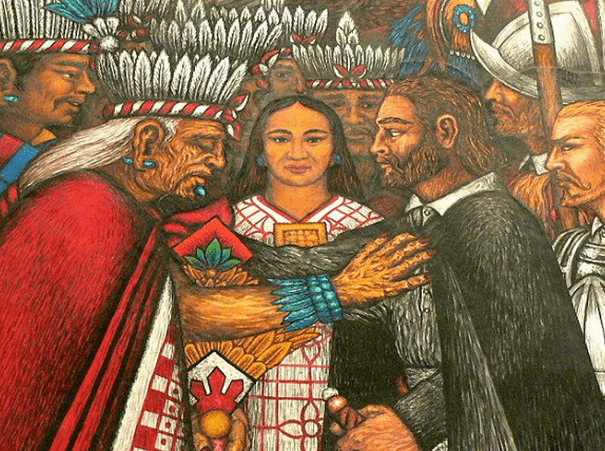Winner of the Fall 2016 StMU History Media Award for
Best Article in the Category of “People”
Best Article in the Category of “World History”
Largely due to the importation of disease and use of superior weapons, the Spaniards were able to conquer the Aztec capital of Tenochtitlan, kill the empire’s last emperor, Cuauhtémoc, and bring the Aztec empire to an end. Few know of La Malinche, the indigenous interpreter of Hernán Cortés, whose linguistic abilities were used to facilitate important conversations between the Spaniards and the indigenous leaders. Without the help of La Malinche, perhaps the Aztec empire would have survived.
Born between 1502 and 1505, La Malinche was named Malinalli Tenepal, the first part of her name being a Nahuatl term for the twelfth day of the month in correspondence to the Aztec calendar, and the second part of her name meaning “lively.” She was born of nobility in Paynala within the region of Veracruz. Her troubles started at a young age after the death of her father. La Malinche was ousted from her home to ensure her new half-brother received the inheritance of the family instead of her, since she was the eldest child. She was given to “some Indians of Xicalango.”1 Then the Indians gave her to a nobleman in Tobasco, a region in the Yucatan. When Cortés arrived to Tobasco, he was offered twenty slaves, one of them being La Malinche. Having lived in Veracruz, a Nahuatl-speaking region, and then being sold into a Maya-speaking region, La Malinche knew both languages and she was soon recognized for the linguistic talents that could benefit Cortés in his conquests.2

The few glimpses of La Malinche and how her presence as an interpreter accelerated the fall of the Aztec empire can be found in the writings of the Spanish explorers, specifically from Hernán Cortés, her “lord and master.”3 From the second letter Hernán Cortés wrote to Emperor Charles V, dated October 30, 1530, Cortés speaks of La Malinche as “a female interpreter that I had, who was a native of this country, and whom I obtained at Putunchún on the Rio Grande.”4 This confirms the vague aspects of her life that we already know. But most importantly, in this context, this letter goes on to tell of a scenario in which La Malinche saved the Spaniards from an ambush by the Cholulans. La Malinche was told by the wife of a native leader that they planned to attack the Spaniards and if La Malinche came with them, she would be protected. La Malinche delivered this message to Cortés, which ultimately led to the massacre of Cholula and provided a direct path to march towards Tenochitlan, the capital of the Aztec empire.5 This leads to the question of whether or not La Malinche was a traitor or a survivor. Did she explicitly want the Aztec empire to fall or did she just want to save herself from the carnage?
With no traces of primary sources from La Malinche herself, her story has been retold by various scholars without much consistency, nothing ever being certain. Up until the twentieth century, La Malinche was viewed as a traitor to her country Mexico. In 1861, on the celebration day of Mexico’s Independence, Ignacio “El Nigromante” Ramírez, a Mexican journalist, addressed the Mexican people by saying, “One of the mysteries of fate is that every Mexican owes his downfall and disgrace to a woman, and to another woman his salvation and glory; the myth of Eve and Mary is reproduced everywhere; we indignantly remember Cortés’s mistress and will never forget, in our gratitude to Doña María Josefa Ortiz.”6 La Malinche is seen as playing a key role in the subjugation of the Mexican peoples to Spain, while Doña María Josefa Ortiz did the contrary and liberated the country. However, many Chicana writers and modern scholars are trying to rewrite the tale of La Malinche to understand the complexities of her choices and to vindicate her. For example, Gloria Anzaldua promotes the idea that La Malinche had a “new consciousness,” that she voluntarily served as the interpreter of Cortés not only to save herself, but also because she knew that a new mestiza culture was going to be born (especially considering she had a son with Cortés in 1524).7 She made a conscious effort to exchange language and cultural aspects from each side in order to facilitate the emergence of the new mestiza society; however, with that came brutal consequences in the shape of warfare and mass death in the New World.
Whether or not La Malinche’s role as Cortés’s interpreter was traitorous, simply an effort to survive, or some other complex reason involving love for Cortés, hate for the Aztec empire for the cruelty she faced after being ousted from her home, or promotion of the new mestiza culture, no one will ever know the true story of the Indian, slave woman who traveled alongside Cortés towards the culmination of the Aztec empire.
- Bernal Castillo del Díaz, The Discovery and Conquest of Mexico, 1517-1521 rev. American ed., trans. A.P. Maudsley (New York: The Noonday Press, 1965), chap. 22-23. ↵
- Pilar Godayol, “Malintzin/ La Malinche/ Doña Marina: re-reading the myth of the treacherous translator,” Journal of Iberian and Latin American Studies 18, no. 1 (April 2012): 61-68. ↵
- Castillo del Bernal, chap 23. ↵
- Hernan Cortes to Emperor Charles V, October 30, 1520, in Letters of Despatches of Hernando Cortes, to the Emperor Charles V., trans. (New York: Wiley and Putnam, 1843), letter II. ↵
- Hernan Cortes to Emperor Charles V, October 30, 1520, in Letters of Despatches of Hernando Cortes, to the Emperor Charles V, letter II. ↵
- Rosario Pérez-Lagunes, “The Myth of La Malinche: From the Chronicles to Modern Mexican Theater” (PhD dis., Virginia Polytechnic Institute and State University, 2001), 24. Although she was of Spanish descent, Doña María Josefa Ortiz was born in Valladolid, Mexico in 1768 and identified herself as Mexican. She and her husband were both a part of the rebellion that ultimately led to Mexico’s independence from Spain in 1824. ↵
- Godayol, 68-70. ↵



230 comments
Anthony Robledo
This article was really interesting to say the least. I have never heard of Malinche or about what she did. I wished i knew mpre about her though! You use some great qoutes and show how she wasn’t a traitor, but i want to see both sides of the story in greater detail. This article does a great job catching my attention and really makes me want to do more research about it on my own. Good job and keep up the good work.
Marlene Lozano
This is an interesting article! I had never heard the story of La Malinche before now. I find it interesting how many people viewed her as a traitor and some viewed her as a survivor. I knew about Hernan Cortes but I did not know that La Malinche had his child and role she played in his life. Overall this article is great.
Natalia Flores
La Malinche in Mexican culture is viewed as a traitor and it’s interesting that not much is known about her. It’s mysterious since she is often talked about in a negative light, but without much solid proof to prove that she is or isn’t. Her motives are still unknown to this day and her complete life is still told in bits and pieces. To make it better, these pieces are inconsistent at times. Thank you for writing this article!
Fumei P.
I just read about La Malinche in the textbook, and I appreciated this article because I thought that her story was so interesting. There doesn’t seem to be a ton of data on this woman. She was born into nobility and then shipped off to live with some other indigenous tribe, then by a stroke of luck Hernan Cortez finds her, the only native that can speak Mayan and Nahuatl. She is loyal to him, and she is ultimately the reason the Aztec Empire falls to Spanish rule. I’m glad there are authors out there willing to do the research and tell her story, because she’s also known as a traitor.
Maria Esquivel
I have knowledge of who Hernan Cortes was but never knew the role La Milinche had in Hernan’s life. I never expected to read that she had a child with Cortes but it was interesting to read about. I also found it surprising how some thought of her as a traitor and others as a survivor. I never thought of her as a traitor but reading this I can know see why they saw her as one. Great Article and I also enjoyed how you added the meaning behind Malinalli’s name.
Ximena Mondragon
This article is really interesting because it gives the reader a new perspective on La Malinche. As a native Mexican I always thought she was a traitor for being on the Spaniards side however this article challenges that perspective and gives good examples on both side of the argument. Overall, this article gets to the point fast and it is very clear. It also is very unbiased which makes it easier for the reader to think of not sides of the argument. However, it needs more evidence on both sides of the argument.
Carlos Vazquez
This article is very interesting I had heard of La Malinche and how she turned her back on the Aztec empire to help the Spaniards but I never really knew the full story. Although we will ever know why she did it, its undeniable that she was an extremely smart woman. She managed to guarantee herself safety while the fate of her native people and empire was undetermined.
Tyler Sleeter
Interesting article. I like how the author presents two sides to the story of La Malinche. On one side she was a traitor to her people, handing them over to the Spaniards to conquer. On the other side, she was a visionary that saw the rise of a new people of Mexico. Without any information from La Malinche herself, this is something historians can only speculate upon for the time being. I think it is interesting that she had a child fathered by Cortes, and I personally think maybe she was simply doing what she felt right to protect the future for her child of mixed heritage.
Maria Callejas
Awesome intro! It gives a clear insight to the importance of the Malinche, as well as it grabs the readers attention instantly. Great usage of in-text quotations, specifically when citing Cortes himself. This adds a sense of validity to the text. One can definitely justify her aidance to the Spaniards because of the mistreat she received by her on community. This was indeed an interesting article, great job!
Crystalrose Quintero
I felt the title itself was pretty intriguing posing two contrasting opinions which are to be answered throughout the article. Again this article halfway throughout the article poses a question to be answered of whether malinche really wanted the aztec empire to fall. It also interesting to find that many scholars try to justify or propose contrasting stories to what Malinche is currently posed as. It really opened my mind to be open to points of view of a story.